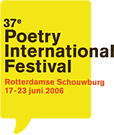Poet
|
Erik Lindner 1968-... country: the Netherlands language: Dutch |
Erik Lindner (Netherlands, 1968) made his début in 1997 with Tramontane, a collection of poems without literary predecessors: Lindner did not join any group or movement. If there would seem to be any exterior influences in his work, these could best be described as ‘accidental passers-by’ – writers and philosophers who happened to cross the poet’s path. In Tramontane one such passer-by is Walter Benjamin, whose motto ‘Man’s gaze is his edge’, seems to offer a key to Lindner’s poetry. In his poems, the edge of man’s gaze is the town, a room, or a landscape. Lindner tries to capture the casually perceived movements in language. His poetry is pervaded by the idea that the word creates a coherence. The idea is found again in Tong en trede (Tongue and step, 2000), a collection which, as poet Jan Baeke put it, evokes a reality ‘which in its seeming triviality brings to light all sorts of wonderful, intangible facets’. This seeming triviality is primarily to be found in Lindner’s images, although ‘observations’ might be a better word: he is a permanent wanderer, a passer-by, who carefully registers the tiny movements of life in a city or the apparent stillness in a room. ‘Thus a passer-by explains what it is to pass by: / a city leaving you while you are staying in it,’ he writes in the opening poem of the cycle ‘Temporary stop’. In Lindner’s poetry each sentence seems to contain a new registration, and the ‘rapid’ succession of the observations suggests something like the continuous movement in reality, the chaos, or, in other words, the simultaneity of all those movements. But Lindner’s poetry does more than record reality with almost cinematic precision. It also shows what the role of language is here: words order the incoherence of the commonplace, while simultaneously creating a ‘membrane’ between the poet and the perceived. Or, as Yves T’Sjoen aptly put it: ‘Lindner’s poetry tries to be an image of motion that cannot be captured in language.’ Author: Janita Monna Translated by Ko Kooman Erik Lindner (Netherlands, 1968) published two volumes of poetry, Tramontane (1997) and Tong en trede (2000). The observation of a gesturing hand or a street scene may be Lindner’s inspiration for a poem. Yet his poetry is anything but anecdotic; his impressions rather tend to result in contemplative, richly metaphorical poems about the (in)adequacy of language. Poets: |


